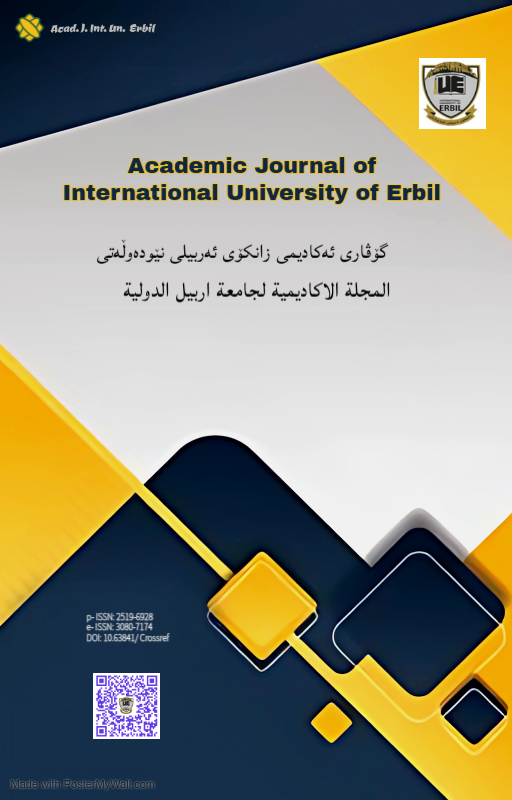Exploring the Influence of Marital Status on Bank Employees' Job Performance: Unveiling Gender's Moderating Role
Exploring the Influence of Marital Status on Bank Employees
DOI:
https://doi.org/10.63841/iue22584Keywords:
Employees, Gender, Marital Status, and PerformanceAbstract
Marital status is a significant dimension since it is connected with the job performance of banking sector employees and different maintenance factors. The present study is an attempt to highlight the impact of marital status on the performance of bank employees, with gender playing a mediating role. Four private banks were selected for this research to collect data from 160 employees. All these banks are from the Nagpur region of Maharashtra, India. For this study, both types of data (secondary and primary) were used. The data was gathered using a simple random sampling technique. A questionnaire was used as an instrument to accumulate data from the respondents. After a detailed literature study, two objectives and a hypothesis were framed. Statistical analyses were done to achieve the objectives, such as the normality test, reliability test, Mann-Whitney test, and regression analysis. It was concluded that married bank employees perform better than unmarried employees and, hence, have higher job performance. Additionally, it was found that males perform their work much better than females.
Downloads
References
M. Tamimi, M. Badrut, and T. Sopiah, “The effect of organizational support on employee performance: A systematic literature review,” Asian Journal of Economics and Business Management, vol. 2, no. 2, pp. 250–256, 2023, https://doi.org/10.53402/ajebm.v2i2.337.
D. P. Moynihan, and N. Landuyt, “Explaining turnover intention in state government: Examining the roles of gender, life cycle, and loyalty,” Review of Public Personnel Administration, vol. 28, pp. 120–135, 2008.
H. Abdul, and W. Aamer, “Employee Development and Its Effect on Employee Performance Framework,” International Journal of Business and Social Science, vol. 2, no. 13, pp. 224-229, 2011.
L. Dumitrescu, D. Deselnicu, V. Lacuta, and B. Danciu, “Satisfaction and Performance of Romanian Employees Working in the Accountancy and Human Resources Fields” Proceedings of the International Conference on Business Excellence, vol. 17, pp. 2119 – 2131, 2023. https://doi.org/10.2478/picbe-2023-0185.
H. Ahmad, Q. Kilani, Z. Al-Zrigat, S. Alnajdawi, A. Mansour, Z. Khasawneh, and Q. Hammouri, “The role of key workplace elements in determining individual and organizational success in Jordan Tourism Board,” Uncertain Supply Chain Management, vol. 12, pp. 263-272, 2024. https://doi.org/10.5267/j.uscm.2023.9.023.
A. A. Nurul, B. O. Khatijah, and N. A. Siti, “Integrity and Employee Job Performance,” Journal of Critical Reviews, vol. 7, no. 16, pp. 517 -521, 2020.
R. T. Celena, “An Examination of Various Factors (Age, Gender, Family Status, Marital Status, and Work Engagement) and Their Relationship to Longevity, Attendance, and Job Performance of Custodial Staff at a Large Public University,” 2017. (Doctoral Thesis) retrieved from https://digitalcommons.lsu.edu/cgi/viewcontent.cgi?article=5251&context=gradschool_dissertations
A. Karananeethi, K. Prihadi, Y. Ho, C. Shoba, G. Nesan, I. Cahyanti, and E. Surjaningrum, “Achieving relationship satisfaction: household gender equality and mattering,” International Journal of Public Health Science (IJPHS), vol. 13, no. 1, pp. 376 – 383, 2024. https://doi.org/10.11591/ijphs.v13i1.23214.
B. Kanchan, and B. Mahak, “Effective Internal Communication: A Crucial Factor Affecting Employee Performance,” Proceedings of International Conference on Management, Economics, and Social Sciences, held on 21-22, Nov 2015, Dubai.
S. Nascimento, & M. Barros, “Endomarketing and Organizational Performance: A Case Applied to a Notary's Office in Goiás,” Científic@ - Multidisciplinary Journal, vol. 11, no. 1, pp. 1-18, 2024. https://doi.org/10.37951/2358-260x.2024v11i1.7244.
A. Tooba, and A. Z. Shameel, “Impact of marital status on job satisfaction, organizational commitment, and work-life balance: A study on employees working in the banking sector of Pakistan,” The Islamic Culture, vol. 40, pp. 63-75, 2018.
R. Kanfer, and P.L. Ackerman, “Work competence: A Person-Oriented Perspective', in A. J. Elliot and C. S. Dweck (eds), Handbook of Competence and Motivation. Guilford Publications. 2006.
D. Farsole, “The Relationship Between Job Satisfaction and Employee Performance,” International Journal of Scientific Research in Engineering and Management, vol. 7, no. 8, pp. 1- 13, 2023. https://doi.org/10.55041/ijsrem25487.
J. R. Van Scotter, S. J. Motowidlo, and T. C. Cross, “Effects of task performance and contextual performance on systemic rewards,” Journal of Applied Psychology, vol. 85, pp. 526-535, 2010.
P.F. Bendassoli, “Desempenho no trabalho: Revisão da literatura,” Psicologia Argumento, vol. 30, no. 68, pp 171–184, 2012.
N. Uwannah, A. Adeoye, N. James, A. Uwannah, and C. Egwuonwu, “Marital Satisfaction, Perceived Organizational Support and Job Involvement Among Employed Women in South-West Nigeria, International Journal of Professional Business Review, vol. 8, no. 11, pp. 1-16, 2023. https://doi.org/10.26668/businessreview/2023.v8i11.4100.
R. Seung, and K. Mustafa, “An Analysis of The Relationship Between Marital Status and Family Structure and On-The-Job Productivity,” 2002. (Master Thesis) retrieved from https://calhoun.nps.edu/bitstream/handle/10945/6027/02Mar_Ryu.pdf?sequence=1&isAllowed=y
L. M. Stephen, and R. B. William, “Marital Status and Productivity: Evidence from Personal Date,” Southern Economic Journal, vol. 72, no. 1, pp. 63-77, 2005.
L. J. Shrum, “The implications of the survey method for measuring cultivation effects,” Human Communication Research, vol. 33, no. 1, pp. 64-8, 2007.
J. K. K. Nazrul, “Use of ICTS in gender equalization” USTC Teachers Annual (USTA-2010)
A. Babic, and I. Hansez, “The Glass Ceiling for Women Managers: Antecedents and Consequences for Work-Family Interface and Well-Being at Work,” Frontiers in Psychology, vol. 12. Pp. 618250, 2021. https://doi.org/10.3389/fpsyg.2021.618250
S. I. Khan, and N. Abdullah, “The impact of staff training and development on teacher’s productivity,” Economics, Management, and Sustainability, vol. 4, no. 1, pp. 37-45, 2019.
S. I. Khan, “Transactional, transformational and Laissez-Faire leadership styles: A meta-analysis comparing women and men,” The Journal of High Technology Management Research, vol. 35, no. 2, pp. 100502, 2024. https://doi.org/10.1016/j.hitech.2024.100502
L. J. Cronbach, “Coefficient alpha and the internal structure of tests,” Psychometrika, vol. 16, no. 3, pp. 297-334. 1951.
J. C. Nunnally, “Psychometric Theory,” 2ème éd., New- York, McGraw-Hill. 1978.
M. H. Ali, and R. H. Mahmood, “Analyzing the Influencing Relationship between Strategic Awareness and Organizational Prosperity through Human Talent Management,” Qalaai Zanist Journal: vol. 8, no. 3, pp 836 – 866, 2023.
S. I. Khan, and N. Abdullah, “The Effect of ATM Service Quality on Consumer Satisfaction and Loyalty: An Empirical Analysis,” Russian Journal of Agricultural and Socio-Economic Sciences, vol. 5, no. 89, pp. 227-235, 2019. https://doi.org.10.18551/rjoas.2019-05.28
Downloads
Published
Issue
Section
License
Copyright (c) 2025 Academic Journal of International University of Erbil

This work is licensed under a Creative Commons Attribution 4.0 International License.












